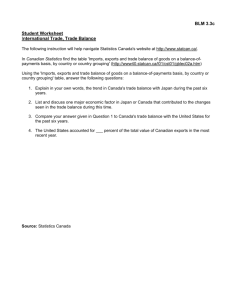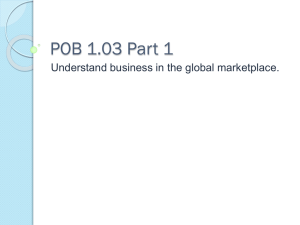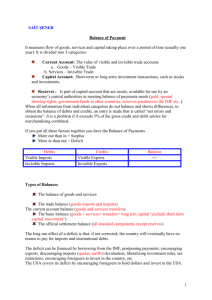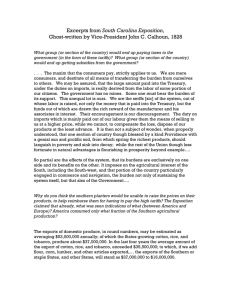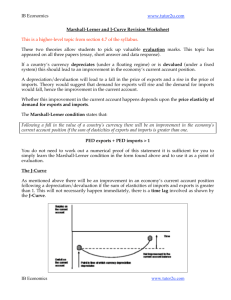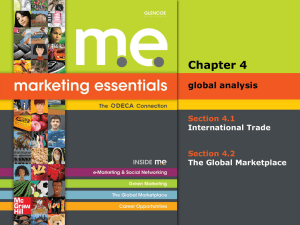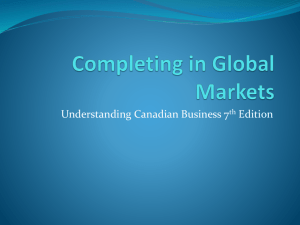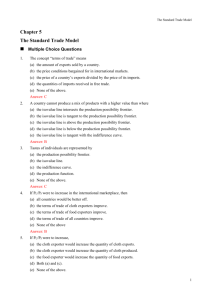Ch5
advertisement
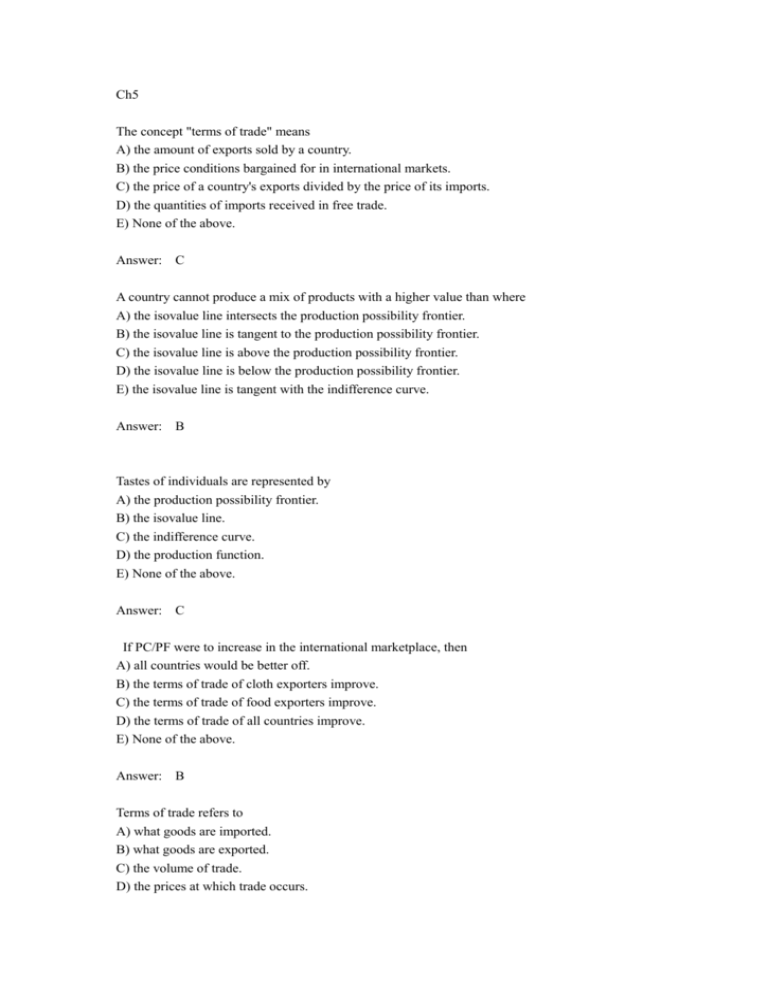
Ch5 The concept "terms of trade" means A) the amount of exports sold by a country. B) the price conditions bargained for in international markets. C) the price of a country's exports divided by the price of its imports. D) the quantities of imports received in free trade. E) None of the above. Answer: C A country cannot produce a mix of products with a higher value than where A) the isovalue line intersects the production possibility frontier. B) the isovalue line is tangent to the production possibility frontier. C) the isovalue line is above the production possibility frontier. D) the isovalue line is below the production possibility frontier. E) the isovalue line is tangent with the indifference curve. Answer: B Tastes of individuals are represented by A) the production possibility frontier. B) the isovalue line. C) the indifference curve. D) the production function. E) None of the above. Answer: C If PC/PF were to increase in the international marketplace, then A) all countries would be better off. B) the terms of trade of cloth exporters improve. C) the terms of trade of food exporters improve. D) the terms of trade of all countries improve. E) None of the above. Answer: B Terms of trade refers to A) what goods are imported. B) what goods are exported. C) the volume of trade. D) the prices at which trade occurs. E) None of the above. Answer: D If two countries with diminishing returns and different marginal rates of substitution between two products were to engage in trade, then A) the shapes of their respective production possibility frontiers would change. B) the marginal rates of substitution of both would become equal. C) the larger of the two countries would dominate their trade. D) the country with relatively elastic supplies would export more. E) None of the above. Answer: B If a small country were to levy a tariff on its imports then this would A) have no effect on that country's economic welfare. B) increase the country's economic welfare. C) decrease the country's economic welfare. D) change the terms of trade. E) None of the above. Answer: C Suppose now that Home experiences growth strongly biased toward its export, cloth, A) this will tend to worsen Home's terms of trade. B) this will tend to improve Home's terms of trade. C) this will tend to worsen Foreign's terms of trade. D) this will have no effect on Foreign's terms of trade. E) None of the above. Answer: A Suppose that Home is a "small country," and it experiences growth strongly biased toward its export, cloth A) this will tend to worsen Home's terms of trade B) this will tend to improve Home's terms of trade C) this will tend to worsen Foreign's terms of trade D) this will have no effect on Foreign's terms of trade E) None of the above Answer: D When the production possibility frontier shifts out relatively more in one direction, we have A) biased growth. B) unbiased growth. C) immiserizing growth. D) balanced growth. E) imbalanced growth. Answer: A Export-biased growth in Country H will A) improve the terms of trade of Country H. B) trigger anti-bias regulations of the WTO. C) worsen the terms of trade of Country F (the trade partner). D) improve the terms of trade of Country F. E) decrease economic welfare in Country H. Answer: D After WWI, Germany was forced to make large reparations-transfers of real income- to France. If the marginal propensity to consume was equal in both countries, and if France's demand was biased toward food (relative to Germany's demand pattern) then we would expect to find A) the world's relative price for food remains unchanged. B) the world's relative price for food increase. C) the world's relative price for food decrease. D) the world relative price for both food and non-food rise. E) None of the above. Answer: B If France exported manufactures, whereas Germany exported food, then the reparations from Germany to France would A) improve France's international terms of trade. B) cause France' terms of trade to deteriorate. C) cause both France' and Germany's terms of trade to deteriorate. D) cause both France' and Germany's terms of trade to improve. E) None of the above. Answer: B Immiserizing growth could occur to A) a poor country experiencing export-biased economic growth. B) a poor country experiencing import-biased economic growth. C) a poor country experiencing growth in its non-traded sector. D) a poor country experiencing capital-intensive biased growth. E) None of the above. Answer: A A large country experiencing import-biased economic growth will tend to experience A) positive terms of trade. B) deteriorating terms of trade. C) improving terms of trade. D) immiserizing terms of trade. E) None of the above. Answer: C If a there are no international loans or capital flows, then if a country's terms of trade improve, we would find that A) the value of its exports exceeds the value of its imports. B) the value of its exports becomes less than that of its imports. C) the value of its exports exactly equals that of its imports. D) the quantity of its exports equals that of its imports. E) None of the above. Answer: C If the U.S. (a large country) imposes a tariff on its imported good, this will tend to A) have no effect on terms of trade. B) improve the terms of trade of all countries. C) improve the terms of trade of the United States. D) cause a deterioration of U.S. terms of trade. E) raise the world price of the good imported by the United States. Answer: C If Slovenia is a small country in world trade terms, then if it imposes a large series of tariffs on many of its imports, this would A) have no effect on its terms of trade. B) improve its terms of trade. C) deteriorate its terms of trade. D) decrease its marginal propensity to consume. E) None of the above. Answer: A If Slovenia is a large country in world trade, then if it imposes a large set of tariffs on many of its imports, this would A) have no effect on its terms of trade. B) improve its terms of trade. C) deteriorate its terms of trade. D) decrease its marginal propensity to consume. E) None of the above. Answer: B
